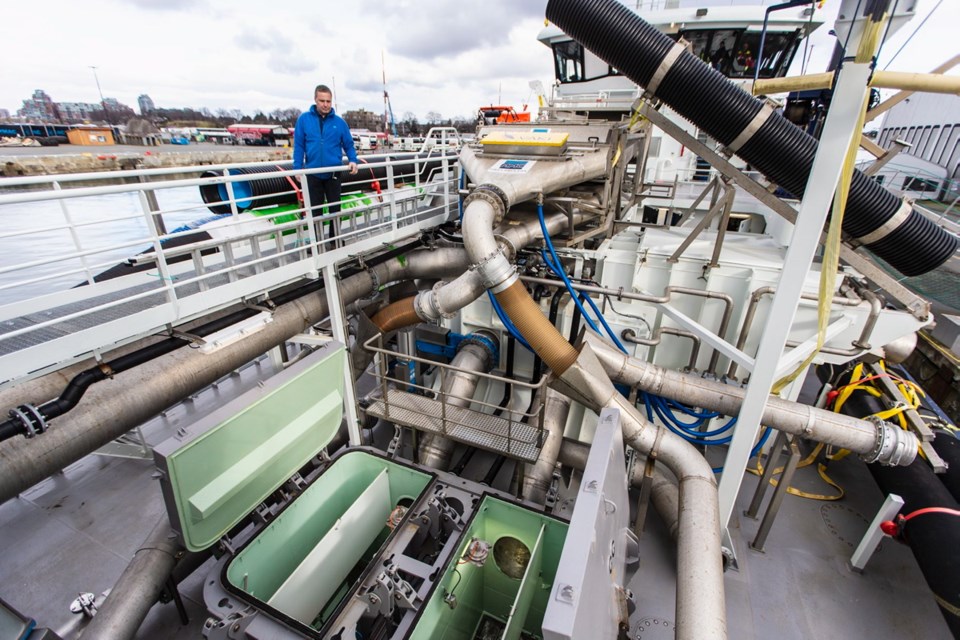A new 70-metre vessel equipped with technology to remove sea lice from farmed salmon has arrived in B.C. from Norway to work for Grieg Seafood B.C. Ltd.
The Ronja Islander is moored at Ogden Point and will service Grieg’s Atlantic-salmon farms around Vancouver Island and the Sunshine Coast.
Lice occur naturally in the environment, but farm critics worry they multiply at fish farms and put wild stocks at risk.
“It is our responsibility to make sure we do not allow [sea lice] to harbour on farm sites and increase in number,” said Dean Trethewey, Grieg’s seawater production director. “Because when the smolts are ready to go back out to the ocean in March, April, May and June, we need to make sure our [sea lice] numbers are very, very low.”
The ship — a kind of closed aquarium — will be doing battle with parasitic lice latched onto farmed salmon.
Huge hoses will suck salmon out of net pens into the ship’s hold to be immersed in a solution of hydrogen peroxide and sea water for 20 minutes, before being flushed back into pens.
About 90 to 95 per cent of lice will be removed, Trethewey said.
Ultra-fine filters capture lice, which will be incinerated on board.
The entire process will typically take about two hours. It was designed to be as gentle as possible on fish, he said.
The latest technology is used on the custom-built 2019 vessel, which Grieg has chartered for five years, Trethewey said. That includes ultraviolet light to disinfect the water and kill viruses — a major concern among fish-farm critics.
About 50,000 fish can be treated at the same time in the hold, which has a capacity of 1,800 cubic metres, he said.
Fish brought on board will go through a grading process to separate out smaller wild fish that have made their way into the pens, such as herring.
The small fish will be returned alive to the sea.
The ship will also deliver smolts from the company’s Gold River hatchery to net pens. A smolt is a young salmon preparing to leave fresh water for the sea.
The hold can carry about 250,000 fish at 100 grams each, Trethewey said.
“As we have salmon farms in the inlets, if we don’t do a good job of keeping those numbers [of sea lice] low, then we can be increasing what’s in the wild as well,” said Trethewey.
The Ronja Islander is one of two new “wellboats” on B.C.’s coast. Last year, Mowi’s 77-metre Aqua Tromoy arrived.
Grieg has 22 salmon farms and marks two decades in B.C. this year.
Two of its farms in Nootka Sound were granted Aquaculture Stewardship Council certification in the past two weeks.
Biologist Alexandra Morton, a longtime opponent of open-net fish farms, advocates fish being raised in tanks on land.
Bringing farmed salmon out of the water and treating them in wellboats, with either hydrogen peroxide or a fresh-water bath, is stressful for the fish, she said.
Morton is particularly concerned about piscine orthoreovirus and the bacteria tenacibaculum, which causes mouth rot in fish.
“This is the problem with the wellboats — it adds so much stress to the production that it is triggering disease.”
The solution is to raise fish in a tank, Morton said. “It would solve all of these problems and the industry would be free to grow. The only limitation would be their own creativity.”



